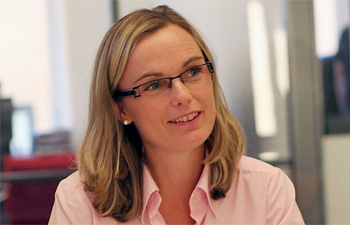

ノルウェー ハルダンゲル地方
ホルダラン県の副市長、
モーナ・ヘッレスネス氏
(Mona Hellesnes)
ホルダラン県の副市長、
モーナ・ヘッレスネス氏
(Mona Hellesnes)

市長になることは自分で選んだ訳ではありません。政党で市長候補に選ばれ、選挙に当選して市長になりました。しかし、政治家になることは自分で選びました。私は社会の発展に興味を持っていて、政治家の仕事は非常に張り合いのある仕事だと思っていました。何よりも民主政治自体に貢献したいと思っていました。
忙しい中どう育てていますか?
私には二人の子どもがいます。20才と23才の息子です。子育て中は多忙でしたが、政治家の仕事と家事を両立させてきました。1995年から2003年にかけて私は “自由時間の政治家”でしたね。幸いにも、夫はフレキシブルな仕事で、子育ては常に夫と協力し合って行いました。もちろん、いつも時間を割いて子どもたちと遊びましたよ。私は7年間サッカーのコーチとして従事し、スキーレースの応援団としても子ども達をサポートしていました。私はいつも優先順位をつけて、子育てと仕事を両立するようにしていました。
3.趣味はありますか?
時間はどうやって作っていますか?
時間はどうやって作っていますか?
趣味に割ける時間はあまりないですね。でも何と言っても私はアウトドア派です。散歩やスキー、ハイキングはいい気晴らしになります。何ごとにも時と場所というものがありますよ。
4.犠牲になっているものはありますか?(例えば睡眠時間、家族との時間、健康など)
5.ストレスはありますか?
ええ、時々。なので、「もちろんやります!」というより「ノー!」をもっと頻繁に言うことにしないといけないと思います。しかし、仕事のストレスや責任を担うことにもう慣れているので、気にしませんね。
6.美しい女性とは、どのような人だと思いますか?(信念をもっているとか、時間の使い方がうまいとか、具体的にお願いします。)
美しい女性とは、「個人的なコミットメント」「自分を信じること」「他者の言うことに耳を傾けること」という資質を持っている方だと思います。
7.「女性が働く意味や意義をどうお考えですか?」
日本では、特に年配者の間では、まだまだ主婦が社会に進出することに理解のない人々が多いです。芸術家や医師、看護師、弁護士のような特殊な職業の場合は別ですが、一般の職業で働くことは、夫に経済力がない場合のといった見方もあり、なかなか、主婦、とくに子育てをしながら働く女性への理解が低く、環境も整っていません。
理解のない人々の考え方を変えるにはどうアプローチすればよいのでしょうか?
日本では、特に年配者の間では、まだまだ主婦が社会に進出することに理解のない人々が多いです。芸術家や医師、看護師、弁護士のような特殊な職業の場合は別ですが、一般の職業で働くことは、夫に経済力がない場合のといった見方もあり、なかなか、主婦、とくに子育てをしながら働く女性への理解が低く、環境も整っていません。
理解のない人々の考え方を変えるにはどうアプローチすればよいのでしょうか?
最初の質問について、国としてノルウェーは働く女性なしでは生き残ることはできないと言えます。ノルウェーの人口も少ないですし、女性が働かないと労働力不足に陥ります。ノルウェーのほぼ全ての女性が働いていても、現在まだ労働力不足です。第二次世界大戦直後、専業主婦になることが数多くの女性の夢でしたが、幸いにも、政治家が、女性は社会に進出すべきだとわかっていたので、(まぁ、それより他に手はなかったということですね)、直ちに断固たる措置をとって改革を行いました。
次に、「理解のない人々の考え方を変えるにはどうアプローチすればよいのでしょうか?」という質問については、次の2つの考えがあります。まず1つ目は、男女平等的な考え方を若者に浸透させること、または、社会の中で女性の価値をどのように向上させていくかを議論することです。これによって理解のない人にも考え方を変えてもらえるのではないでしょうか。今後の日本経済は、女性が働くことが前提です。重要なのは、ファシリテーションだけでなく、若者の意識の変化が必要とされることでしょう。2つ目は、女性のエンパワーメントです。要するに、女性にあらゆる意味で権限を与える必要があると思うのです。
次に、「理解のない人々の考え方を変えるにはどうアプローチすればよいのでしょうか?」という質問については、次の2つの考えがあります。まず1つ目は、男女平等的な考え方を若者に浸透させること、または、社会の中で女性の価値をどのように向上させていくかを議論することです。これによって理解のない人にも考え方を変えてもらえるのではないでしょうか。今後の日本経済は、女性が働くことが前提です。重要なのは、ファシリテーションだけでなく、若者の意識の変化が必要とされることでしょう。2つ目は、女性のエンパワーメントです。要するに、女性にあらゆる意味で権限を与える必要があると思うのです。
8.「仕事と家庭(家事)を両立させる工夫を教えて下さい。」
主婦が働くということは、日本では仕事が増えることを意味します。いかに家事を時短で済ませることができるかが、いかに時間を有効に使うことができるかが課題です。具体的な時短テクニックを教えて下さい。
例えば、スピード料理や常備菜、食事の支度、片付けの工夫、掃除の工夫、洗濯の工夫…など。
主婦が働くということは、日本では仕事が増えることを意味します。いかに家事を時短で済ませることができるかが、いかに時間を有効に使うことができるかが課題です。具体的な時短テクニックを教えて下さい。
例えば、スピード料理や常備菜、食事の支度、片付けの工夫、掃除の工夫、洗濯の工夫…など。
大事なのは、全部の家事を自分だけで抱え込んではいけないということです。家族全員を巻き込んで下さい。また、家事を完璧にこなそうと思わない方が良いでしょう。例えば、以前私は毎週土曜日に大掃除をしていました。でも週末の時間がほとんどなくなってしまったので、とてもうんざりしてしまい、掃除を金曜日の夜に変えました。すると、週末が家族の「かけがえのない時間」となり、生活の質がすごく向上したのです。そして、もし平日に掃除が必要だと気付いても、「金曜日まで待っていてもいいのでは?」と自分に言い聞かせました。
料理に関しても、皆が帰宅する前にお母さんが一人でご飯を作るというのではなく、皆が帰宅してから互いに協力し合って作るというやり方にしています。食事の時間を厳格に決めずに、状況に合わせています。お母さんは料理を作る人ではありません。家族全員がそれを認めなければならないということが重要なポイントです。
料理に関しても、皆が帰宅する前にお母さんが一人でご飯を作るというのではなく、皆が帰宅してから互いに協力し合って作るというやり方にしています。食事の時間を厳格に決めずに、状況に合わせています。お母さんは料理を作る人ではありません。家族全員がそれを認めなければならないということが重要なポイントです。
9.「子どもとのコミュニケーションの工夫は何ですか?」
仕事を持っていると、帰宅後は、家事に追われ、なかなか子どもとゆっくり話ができない、また行事に参加できないなど子供と触れ合う時間に制限があります。
どのような工夫をされていますか?
仕事を持っていると、帰宅後は、家事に追われ、なかなか子どもとゆっくり話ができない、また行事に参加できないなど子供と触れ合う時間に制限があります。
どのような工夫をされていますか?
実際には非常に簡単ですよ。子どもたちが起きている間に、家事をしないということです。彼らが眠りについたとき、私は家事や残っている仕事をしていました。また、次のことを両立させようと心掛けました。例えば、息子たちと一緒にテレビを見ながら、私は洗濯物をたたむなどです。同時にできますよね。また、子どもたちに本を読み聞かせるのも良好なコミュニケーションの方法です。もちろん、それに時間を割くことは犠牲だと考えてはいません。自然の優先順位なのですから。
10.「健康管理について聞かせて下さい。」
働く上で最も重要なのが健康です。健康でなければ元気に仕事もできません。しかし働く主婦は大忙しです。すべてを完璧にこなそうと思うと睡眠時間を削らなければならないこともあります。市長は何時間、睡眠をとっていますか?また運動など何か健康のために行なっている事はありますか?
働く上で最も重要なのが健康です。健康でなければ元気に仕事もできません。しかし働く主婦は大忙しです。すべてを完璧にこなそうと思うと睡眠時間を削らなければならないこともあります。市長は何時間、睡眠をとっていますか?また運動など何か健康のために行なっている事はありますか?
まぁ、もちろん以前よりも睡眠が足りなくなりましたが、それは慣れなければいけないと思っていますね。運動に関しては子どもたちとハイキングやサッカーのトレーニングをしてきました。
多分、日本には完璧主義者の人が多いのでしょうね。きっと、「全てを『完璧』にしなきゃ!」と考えるより 「まぁいいことにしよう!」と考えたら幸せなんじゃないかしら。
多分、日本には完璧主義者の人が多いのでしょうね。きっと、「全てを『完璧』にしなきゃ!」と考えるより 「まぁいいことにしよう!」と考えたら幸せなんじゃないかしら。
11.主婦が働くうえで、最も大切なことを教えて下さい。
日本の場合では、もっと保育園制度を充実させることですね。ノルウェーでは一般的に良い保育園システムがあります。
12.日本のように、正規雇用の入社が4月に一斉にあるわけではないノルウェー、常に自分を売り込み履歴書を送るノルウェーの女性は、どのような点をアピールするのですか?
1)プロフェッショナルな能力(女性と男性の主な違いはありません)。
2)仕事以外に携わった活躍。
3)柔軟性。家族がいるということは、雇用主には特に問題はありませんが、重要なのはどういう風にそれを雇用主のニーズに合わせて調整するかということです。あなたにはどういうサポートをしてくれるネットワークがあるのかという点が重要です。
2)仕事以外に携わった活躍。
3)柔軟性。家族がいるということは、雇用主には特に問題はありませんが、重要なのはどういう風にそれを雇用主のニーズに合わせて調整するかということです。あなたにはどういうサポートをしてくれるネットワークがあるのかという点が重要です。
13.仕事を辞めて欲しいという男性とは結婚する気はないでしょうか?
そのような男性はノルウェーにはあまりいませんか?
そのような男性はノルウェーにはあまりいませんか?
私はそのような男性とは結婚しませんし、ノルウェーにはそのような男性は多くありません。しかし、ノルウェーのシステムでは、この「仕事を辞めて欲しい」という考え方を回避するため、雇用の記録を持っていない人には有給育児休暇が出ないことになっているのです。
14.子どもを産まない人は、未婚、既婚に関わらず、かわいそうだと思われる傾向があると聞きました。どんなに忙しくても子どもを産みたいと願う女性がほとんどですか?
ええ、そうですね。男女問わず、ほとんどの人が子どもを欲しがっています。しかし、子どもがいないからといってかわいそうだと思われる傾向はそんなにありません。社会から子供を産みなさいという要求もありません。
15.日本では、優秀な女性正社員が妊娠すると、会社は歓迎しない場合が多いのですが、ノルウェーではあり得ないことですか?
ええ、有り得ませんね。もちろん、それが全くないとは言えませんが、ノルウェーではまれです。ノルウェーの作業環境法の賠償金制度によって、妊娠を理由に女性を辞めさせることが出来ないので、99.5%問題になりません。
16.産休・育児休暇も有給だと聞きました。育児休暇を取って復帰の段階で退職するというようなケースはありますか?
それは起こりますが、これは利己的利用なのかはよく分かりません。ただ転職したいと思った結果なのかもしれません。ノルウェーでは柔軟な取決めがあり、父と母の両方が産休、育児休暇を取り子育てをしています。1990年代から育児休暇の取り方に大きな変化がありました。私が最初の息子を産んだ時、有給なしで20週間の産休をとりましたが、現在は48週間有給産休を取ることができます。ここ数年で、育児休暇に対する態度に大きな変化がありました。
17.出産・育児のせいで、出世できないようなケースはあるのでしょうか?
いくつかのケースがあるでしょう。例えば、育児休暇中に職場再編や合併等で、自分の仕事がなくなるなどです。しかし、一般的には出産は出世に影響しません。
18.パートナーとの家事の分担はたいていうまく行くのでしょうか?
日本では女性の負担がまだまだ多いのですが…。
統計によると、家庭の責任を担う上でまだ女性の方が多いようですが、実際は、夫と責任を分担しているのが一般的だと思います。例えば、一部の男性は、偉大な料理人にもなりますし、私の場合は材木を切り出すのが苦手です。重要なのは、それぞれの家族に合った実用的な家事分担の仕方を見つけることです。
日本では女性の負担がまだまだ多いのですが…。
統計によると、家庭の責任を担う上でまだ女性の方が多いようですが、実際は、夫と責任を分担しているのが一般的だと思います。例えば、一部の男性は、偉大な料理人にもなりますし、私の場合は材木を切り出すのが苦手です。重要なのは、それぞれの家族に合った実用的な家事分担の仕方を見つけることです。
19.転職は多いですか?日本では就職から3年くらいで退職するか、転職したり留学したりする人が多いです。
実際にノルウェーでは仕事によってかなり異なっています。でも、20年前より今は転職するのが一般的になっています。つまり、大企業でない限り、ずっと同じ会社で働くのはもはや一般的ではありません。私は4年以上仕事を持っていませんでした。それに、それを問題として考えることはありませんね。
20.就職して定年まで働く女性は5割を超えますか?
それは統計を見てみないと分かりませんが、5割を超えているのではないかと思います。
21.最後に、 ハルダンゲルのような場所では、全員車通勤ですか?教習所に通うのも大変そうですが。
ええ、ほとんどの人が車通勤です!都市部では公共交通機関が優れているため、バスと電車で通勤できますが、ハルダンゲルではそこまでは発達していないのです。一部の人々は、一台の車を共有して通勤しています。
最後に、私はこのインタビューの中で「柔軟性」と「個性」がキーワードになっていると言いたいと思います。
最後に、私はこのインタビューの中で「柔軟性」と「個性」がキーワードになっていると言いたいと思います。


Interview with Mona Hellesnes, the Vice-Mayor in Hordaland state.

Well, to begin with, becoming mayor of a county (or state) is not a choice – but I chose to become a politician. I am concerned with society development, and it is meaningful to do this kind of political work. As in many other countries, the electoral system in Norway is a system you negotiate for positions after the election, and I want to contribute to this democracy.
2.Do you have any children? And if so - with a busy schedule, do you have the time to raise them?
I have two children – two boys, 20 and 23 years old. It has always been a busy lifestyle, working full time being engaged in politics. From 1995 to 2003 I was something I would like to call a” spare time politician”. I have a very supportive and flexible husband, and we have always shared the housework. I have also participated actively in the children’s lives as well. I was the kids’ football coach for 7 years and in a special committee arranging cross-country ski events. I have always tried to balance my time to get enough time together with my children.
3.Do you have any hobbies? How do you manage to get time to do the things that YOU want to do?
It is not so much time for my own hobbies. I try to do some physical training because it gives you energy. I like to be outdoors with my family doing cross-country ski in the winter and hiking in the summertime.
4.Have you had to make any sacrifices to follow this career path?
No, I don’t think so. I have to admit that I’ve not had much of a social life on the side, but that has been well compensated for with a good professional social network related to my work. And I don’t consider this a sacrifice.
5.Making ends meet, do you have much stress in your daily life?
Yes, from time to time. The consequences have been that I have had to say ”no” more often than I want to. But I don’t mind the workload since I am used to have a lot of things on my mind at the same time. So it’s going to be extremely intense the day I let stress get the best of me.
6.In your opinion, what is a “beautiful”/”strong” woman - or what essential qualities must such a woman have?
I think such qualities are personal commitment, to believe in what you do, and to be a good listener. And it is also important to be structured in your work. You will succeed if you work systematically with a clear objective.
7.What do you think about the importance of women’s paid labor? In Japan, especially among the older generation, there are still many who don’t accept the fact that housewives can make a career in the society. (If one disregards specific careers such as artists, doctors, nurses or lawyers) And there are big differences in pay between men and women. Especially the fact that housewives working at the same time they raise their children is still not widely accepted, and the workplace is not suitable for women with children. How can we change the minds of those who still think like this?
To the first question, I would say that Norway as a nation cannot survive without women working. We are very few people in Norway and unless the women were employed it would have been a labor shortage. To say it with an old slogan: “Without women Norway stops”. Almost all women in Norway are working, and still it is a shortage of labor. As a society we cannot afford not to have women in labor. The “Housewife dream” was marketed after the 2nd World War II, but, luckily, we soon discovered that this was not a viable alternative.
To the second question “How can we change the minds of those who still think like this? “, I will have to say that immediately there are two ideas that strike me. 1) Start with the youngest. 2) Highlight the values women stand for. Maybe Japan has a culture that makes it a long way to go. One must begin with young people, and afford to take a debate about the consequences if no changes are made. Japan's economy in the future will depend on the fact that women work. Facilitation requires changes in attitudes, not only in young women, but also in men. Japan must aim to empower women.
To the second question “How can we change the minds of those who still think like this? “, I will have to say that immediately there are two ideas that strike me. 1) Start with the youngest. 2) Highlight the values women stand for. Maybe Japan has a culture that makes it a long way to go. One must begin with young people, and afford to take a debate about the consequences if no changes are made. Japan's economy in the future will depend on the fact that women work. Facilitation requires changes in attitudes, not only in young women, but also in men. Japan must aim to empower women.
8.“Home and work”, you have to teach me the secret how you manage to combine these two things. If a housewife is working in Japan, it just means that her workload is doubled. Do you have a special technique to get out of the "time squeeze"?
First of all, do not try to do everything by yourself! Involve your family! Lower your demands! I can give you an example. I was so tired of spending Saturday’s housecleaning (this was when the youngest was 3-4 years and we also had farm work to be done), so we decided to move housecleaning to Friday afternoon. Then we had a family night after we had finished cleaning. Doing this gave us more “quality time” in the weekends. And even though I saw a need for house cleaning on, say Tuesday’s, I said to myself that “let’s do this on Friday instead”.
In my house the food is not on the table when everyone comes home, we do it together and everybody helps out. For example, my husband always cooked food after football practice was over. I never liked fast food; I don’t like quick solutions. The family must accept that the mother is not supposed to do everything alone, and it must not be too rigid patterns (like being forced to eat at a certain time etc.).
In my house the food is not on the table when everyone comes home, we do it together and everybody helps out. For example, my husband always cooked food after football practice was over. I never liked fast food; I don’t like quick solutions. The family must accept that the mother is not supposed to do everything alone, and it must not be too rigid patterns (like being forced to eat at a certain time etc.).
9.How do you communicate with your children? When you are working, it is natural that there are many things you miss. For example, back home from work you are maybe too busy with house work to sit down quietly with the children, or considering your limited time it is not possible to participate in activities important to them. How do you solve this problem?
Well, it actually is quite simple: I did not do housework while they were awake. When they went to sleep I did house keeping or unfinished work. I tried to combine these things. And when I made food for the boys, I did housework in the kitchen at the same time. When they looked at children's TV, I could fold the laundry while watching TV with them. Also, reading for the children in the evening is good communication. But when you have small children you have to let go of your own interests for a while, like reading books. But this is just a matter of priorities that comes very naturally.
10.“Without health you have nothing” – As double-working housewives health is very important. But if you want to do everything perfect, you may be forced to cut back on sleep etc. Are you getting enough sleep? Do you exercise? What do you do to maintain good health?
Well, a little less sleep is something you have to get used to. I've been training football with the children and hiking in the mountains. Maybe in Japan they try to be too perfect. Perhaps it is better to think, "What is good enough?
11.What do you consider the most important factor when it comes to being a working mother?
It must be commonly accepted to send children to kindergarten, with the facilitations to do so. In Norway there is a good kindergarten system.
12.In a country that stands in stark contrast to Japan, where all new employees usually only get hired once a year (April) at the same time, what do Norwegian women do to appeal to the employer? Which points are important to emphasize on the CV for a woman seeking a job?
1) Professional competence (it is not major differences between women and men).
2) Interests, or if you have held any positions, what particular activities you have been involved in etc.
3) It is also about flexibility, or having a flexible character. Having a family is no problem with the employer, but what is important is how to organize this in relation to the needs of the employer. What kind of network do you have? It has come more and more clear to me that this point is important.
2) Interests, or if you have held any positions, what particular activities you have been involved in etc.
3) It is also about flexibility, or having a flexible character. Having a family is no problem with the employer, but what is important is how to organize this in relation to the needs of the employer. What kind of network do you have? It has come more and more clear to me that this point is important.
13.Would you marry a man who asked you to quit your job to stay home with the kids? Is there such a man in Norway today?
To the first question: No. To the second: yes, unfortunately. There are not many, but some, who marry women with different cultural backgrounds. But Norway’s system prevents this type of thinking. For example, for maternity leave with pay you must have had a record of employment.
14.Regardless whether you are married or not, I have heard that there is a tendency to "look down on" those who cannot bear children. Is it true that no matter how busy you are the majority of Norwegian women wants to bear children?
Yes, most people want children, not only women but also the majority of Norwegian men. But it's not a problem anymore if you don’t have your own family or children. To the extent there is a problem it would have to be on an individual level amongst the women who, for one reason or another don’t have children. There is no negative focus from the community whatsoever.
15. In Japan it is often the case that when skilled female employees suddenly become pregnant, this creates dissatisfaction with the company and they have little (or no) support from employers (which may make it difficult to come back after maternity leave). Are these reactions unthinkable in Norway?
Yes. I will not pretend that it does not happen, but it is rare. The Working Environment Act, with its system of financial compensation etc., is structured so that this will not happen. So in 99.5% of the cases this is not an issue.
16.I've heard that maternity leave in Norway is paid. Are there cases where people have exploited this system by taking maternity leave and the moment they are supposed to go back to work, they just quit?
It happens, but if this is exploitation, I am not sure. It could just be a result of the desire for another job. We have a flexible arrangement in Norway - both in terms of distribution of maternity leave between father and mother (combining partial work and partial maternity leave). In the 1990s there were major changes to maternity leave arrangements. When I gave birth to my oldest son I had 20 weeks leave, today there are 48 weeks with full pay. There have also been major changes in attitudes towards this.
17.Are there many cases when a career has been destroyed because you have become pregnant and gone out on maternity leave?
There are some cases, I think. For example, while being on leave there may have been done some reorganizations, mergers, sales, etc. However, there will always come a new chance, and this limits the consequences. Such cases are very rare.
18.Is housework fairly equally divided between you and your partner? In Japan it is still most women who must bear the burden.
Statistics shows that there are still more women than men who take responsibility for the household, but usually you share the burden with your husband - just doing different things. Some men are great cooks, and me for example, I am not very fond of chopping wood. The important thing is to find practical solutions that suit you.
Statistics shows that there are still more women than men who take responsibility for the household, but usually you share the burden with your husband - just doing different things. Some men are great cooks, and me for example, I am not very fond of chopping wood. The important thing is to find practical solutions that suit you.
19.Is it common to change jobs (many times) in Norway? In Japan it is common to have a career change after approx. 3 years. Then you either change your job or take a year as an exchange student somewhere.
This is really varying in Norway. It is more common now than 20 years ago to switch jobs. “Gold Watch status” (25 years in the same company) is probably not very common anymore, unless it is a large company like Aker Group, Statoil, etc. where you can switch jobs internally in the same company. Me, I have not had a job longer than 4 years, and have never thought of it as a problem.
I really do not know, but I think so. You have to check the statistics to be sure.
Yes, almost everyone! Some people share one car to work. In the cities it is the opposite because the public transport is organized in a better way.
Finally, I would like to say that the words “flexibility” and “individuality” are keywords in what we've talked about here.
Finally, I would like to say that the words “flexibility” and “individuality” are keywords in what we've talked about here.



